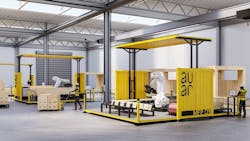ABB Robotics teams with AUAR to build sustainable wood homes
ABB Robotics announced March 26 that it’s collaborating with U.K.-based tech start-up Automated Architecture (AUAR) to advance the use of robotic micro-factories to build affordable, sustainable, low-energy timber homes.
AUAR integrates robotic automation into the building process to reportedly tackle skills shortages, boost sustainability, and improve health and safety by deploying robots in a global network of local micro-factories, which construct energy-efficient, affordable buildings from sheet timber.
“The increasing capabilities of robots enabled by vision and AI, coupled with their inherent speed, flexibility and consistency, makes them the ideal solution for meeting the growing need for affordable, high quality, sustainable housing,” says Craig McDonnell, managing director for business line industries at ABB Robotics. “With 95% of building firms in our recent market survey describing sustainability as important or very important to their businesses, and 38% viewing robots as a way of reducing waste, our collaboration with AUAR opens new possibilities for homebuilders to deliver affordable sustainable homes at scale.”
ABB reports it already helps construction companies automate their processes. Its robots are used in modular assembly and 3D printing building projects worldwide, as well as academic projects researching new ways to integrate robotic automation into construction. Its collaboration with AUAR follows ABB’s recent announcement that it’s working with German management consultant, Porsche Consulting, to develop innovative practices in modular home manufacturing.
AUAR’s goal is to work with one type of material and one type of machine to simplify supply chains. The production process uses standard timber sheets. A robot cuts the sheets into components, and assembles them into units that are transported to sites, enabling completely customized homes to be built in a matter of weeks.
While many of its assembly tasks are automated, AUAR reports its approach supports local jobs by promoting the use of micro-factories close to construction sites, where local contractors and suppliers can coordinate delivery. This micro-factory approach is flexible enough to meet the needs of each market. Each micro-factory can be scaled to reflect local needs, with the ability to ramp up production by adding modular robot cells.
“With the focus on the dual needs of building more affordable homes and minimizing the environmental footprint of buildings throughout their lifetime, automated modular construction presents a great opportunity to rethink the way that the buildings are constructed,” adds McDonnell. “Our collaborations with AUAR and Porsche Consulting mark an exciting step in our efforts to accelerate the use of robotic automation in the construction industry to help address its challenges and deliver the sustainable buildings of the future.”
About the Author

Leaders relevant to this article:

